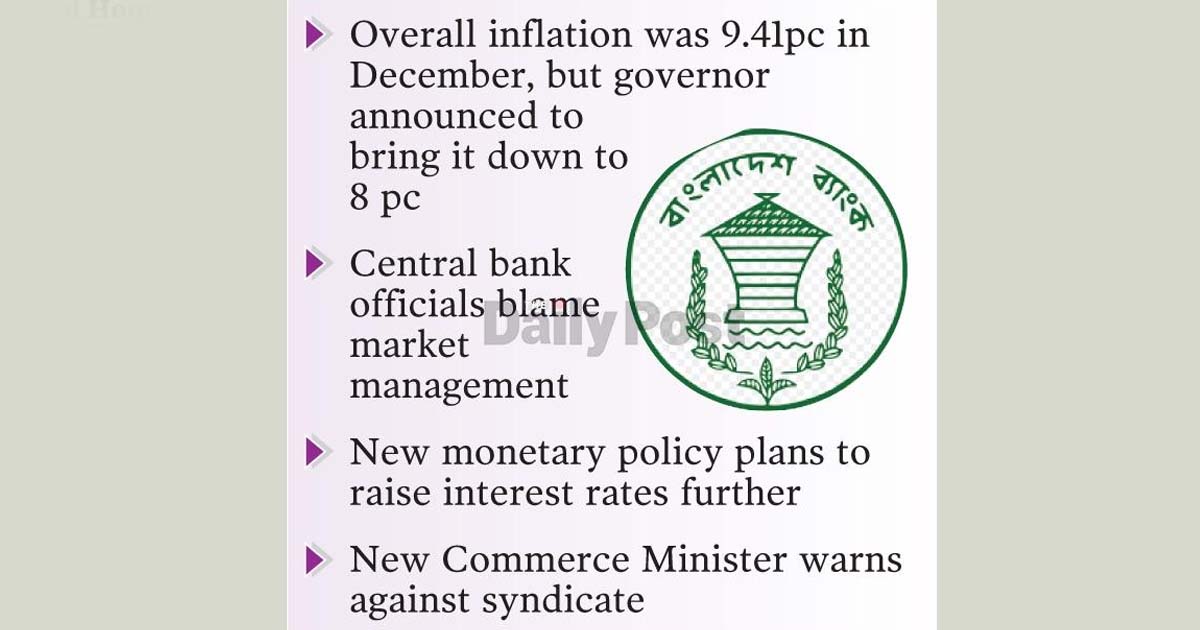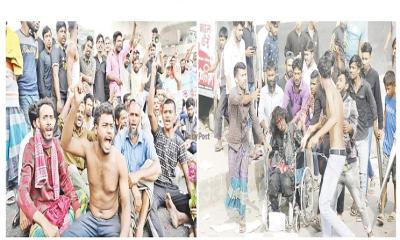- Overall inflation was 9.41pc in December, but governor announced to bring it down to 8 pc
- Central bank officials blame market management
- New monetary policy plans to raise interest rates further
- New Commerce Minister warns against syndicate
The central bank's measures to control inflation are not working. The upward trend is not being stopped by radical changes in currency management. Bangladesh Bank (BB) Governor Abdur Rauf Talukder failed the inflation test despite applying all the economic formulas.
Senior officials of the central bank are blaming the market management for this. They said this is the result of the syndicate's failure to rein in. The government and the central bank are equally responsible. Soon after the formation of the new government, the prices of all types of commodities started increasing in the market. If this situation continues, inflation will go to double digits (above 10 percent) by the end of January. However, the outgoing Commerce Minister Tipu Munshi repeatedly expressed helplessness, but the new State Minister for Commerce warned about responsibility.
BB has been insisting that inflation will be brought down to 8 percent by December. After the monetary policy in the first half of the current financial year, there was a change in the monetary management in November last year. In the first meeting of the reconstituted Monetary Policy Committee, a hasty decision was taken to rein in inflation. On November 26, through a press conference, it was said to control inflation by increasing all types of interest rates.
BB Chief Economist Dr Md Habibur Rahman said the target is to reduce the GDP growth rate to 8 percent in December and 6 percent at the end of the fiscal year (June). But at the end of December, inflation did not rein in much. The overall inflation stood at 9.41 percent. That is, the steps taken by the central bank to control inflation have not been of much use. In this context, the new monetary policy is being announced on January 17 which was passed by the board of BB yesterday. Whether the new monetary policy will continue the fruitless currency management or there will be new surprises, it will have to wait one more day. However, according to central bank sources, the monetary policy formulation committee is focused on controlling inflation in the old policy by increasing the interest rate further.
According to the latest data from the Bangladesh Bureau of Statistics (BBS), the overall inflation in December decreased slightly compared to the previous month. The overall inflation has come down to 9.41 percent this month, which is the lowest in the last eight months. In November, the overall inflation in the country was 9.49 percent. Food inflation fell below 10 percent in December, both rural and urban, but non-food inflation rose slightly. BBS data shows that overall food inflation was 9.58 percent in December 2023. In November, the inflation was 10.76 percent. Food inflation was 12.56 percent in October, the highest in nearly 12 years. In December, the overall inflation in rural areas was 9.48 percent, while in urban areas it was 9.15 percent.
An analysis of central bank data shows that the interest rate of bank loans in the country has increased by about 3 percent in the last six months in front of the goal of controlling inflation. The highest interest rate on bank loans rose to 11.89 percent in January this year.
In fact, despite not falling in Bangladesh, the price of fuel oil in the world market has fallen by more than 10 percent on average in 2023. Global food prices fell by about 14 percent. During this time, the price of food grains has also decreased by about a quarter. The cost of transporting international goods has also decreased significantly. But none of these have seen a positive impact in the Bangladesh market. On the contrary, the prices of all essential commodities, including fuel oil, have increased in the country in the last one year. The people of the country were suffering from the pressure of high inflation throughout the last year.
According to the central bank, BB has completed preparations to announce the monetary policy for the second half of the current fiscal year 2023-24. The monetary policy for the six months of January-June will be announced on Wednesday. Meanwhile, the basic structure of the monetary policy has been finalized The draft of the monetary policy approved at a meeting of the Monetary Policy Committee chaired by Governor Abdur Rouf Talukder was approved at the meeting of the central bank's board on Monday.
According to the sources, the continuation of the contraction-oriented monetary policy announced for the first half of the fiscal year will continue in the second half. In this case, the announcement of increasing the interest rate may come. The basic interest structure of monetary policy like policy interest rate, repo, reverse repo may also be increased. And in determining the exchange rate of the dollar, it may be announced to follow the 'crawling peg' policy directed by the International Monetary Fund (IMF).
However, BB wants to take more time to implement the policy and fix the structure. Private sector credit growth target may be limited to 11 percent. In all, there will be a special announcement in the new monetary policy to bring back good governance in the banking sector, the sources said.
BB Chief Economist Dr Md Habibur Rahman said, "We have formulated the monetary policy after reviewing the overall indicators of the economy. Our main challenge right now is to bring inflation under control. The contractionary monetary policy is being formulated to implement the goal."
Meanwhile, the central bank is not able to overcome the dollar crisis even after reducing imports by more than one-third. Besides, the liquidity or cash crisis has become acute in the banking sector. Private investment is also stagnating. The government's borrowing from domestic and foreign sources is increasing. On the contrary, revenue collection is decreasing. The government is unable to pay subsidies and incentives for various sectors, including electricity and fertilizer, due to the financial crisis. The government is taking steps to pay the subsidy liability by issuing special treasury bonds. The country's capital market is also stagnant.
Economist Dr Ahsan H Mansur said the new monetary policy should be formulated with the main goal of controlling inflation. He said, "To control inflation, the interest rate on loans may have to be taken to 16 to 18 percent. Interest rates on treasury bills and bonds have now risen to about 12 percent. It should be increased at the rate of 1 percent every month. At the same time, the government should completely stop lending money by printing new money. For this, the government's proposed budget or expenditure target needs to be reduced by at least Tk 1 lakh crore. If this happens, there will be no need to print new money."
Former governor of BB Salehuddin Ahmed believed that it is not possible to control inflation in the country only by increasing or reducing interest rates. He said, "No goal will be achieved by making some numerical changes and refinements in the monetary policy in the existing economic structure of the country. Good governance and reforms are needed to overcome other economic crises, including controlling inflation. In particular, the central bank needs effective supervision on the banking sector. Without corporate governance, no policy will work. Salehuddin Ahmed thinks that the flow of credit to the country's small, small and medium enterprises (SMEs) will have to be ensured in the new monetary policy. To control inflation, the production of goods has to be increased as well as the supply will have to be increased. Discipline must be brought to the market system. Effective initiatives should be taken to increase employment in the country. If there is no clear message on these issues in monetary policy, there is no point in formulating or announcing it."
He also added that to overcome the dollar crisis, emphasis needs to be given on increasing remittance and export earnings. Especially, illegal hundi activities should be stopped. Export products should be diversified. There is no scope to appease the readymade garment sector. Effective initiatives will have to be taken so that plastic, leather, jute and other products can take place in the world market. The country's financial accounts are in a negative trend in many ways. To make this positive, foreign direct investment (FDI) needs to be increased. Without effective rule of law and timely customs, foreigners will not be attracted to investment. Foreign investment will not come to the capital market only through road shows.
ARS







